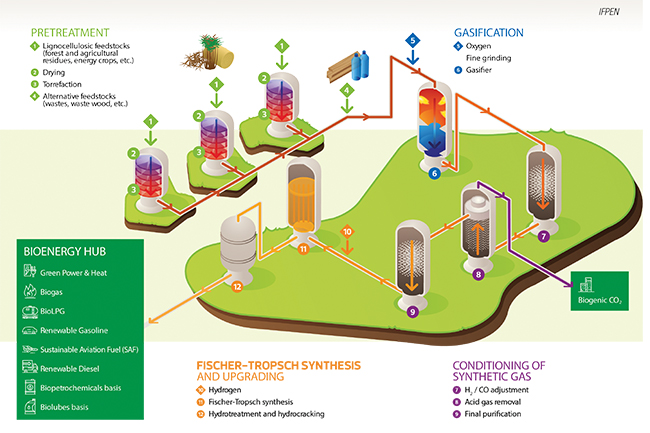Bionext and its partners — a consortium of six industrial companies — have successfully completed the test program on BioTfueL demonstration units, setting the stage for commercialization of the thermochemical process that makes low-carbon-footprint sustainable aviation fuel (SAF) and other products. The BioTfueL process (diagram) consists of four steps: pretreatment, gasification, synthesis gas (syngas) conditioning and Fischer-Tropsch (F-T) synthesis and upgrading.

Pretreatment consists of a drying and torrefaction process (around 300°C and almost atmospheric pressure), followed by a grinding into a powder, explains Rodrigo Teixeira-Pinto, BioTfuel technologist at Axens Solutions (Rueil Malmaison, France; www.axens-solutions.net). Torrefaction increases the energy density and the storage stability of the biomass, while enabling the process to homogenize different types of biomass before gasification, he says.
In the second step, the biomass powder is fed to the Uhde entrained-flow gasification process with Direct Quench (PDQ) — a high-temperature (1,200–1,600°C) and high-pressure (up to 40 barg) partial oxidation process that converts carbonaceous material into a tar-free syngas. The H2-to-CO ratio is then adjusted via a water-gas-shift reaction, followed by acid-gas removal and further purification to remove any catalyst poisons. The conditioned syngas then undergoes F-T synthesis in a three-phase slurry bubble column (SBC), which allows “perfect control of the highly exothermicity and optimal homogeneity of the reaction,” says Teixeira-Pinto. F-T products are then upgraded to advanced biofuels, such as synthetic aviation fuel (SAF) and renewable diesel, but also renewable naphtha (for possible blending in gasoline pool). “The BioTfueL chain can generate some high-value co-products, such as biogas, ‘green’ power and biogenic CO2, which makes this technology a BioEnergy Hub,” he says.
The semi-industrial-scale demonstration units are located at Avril’s Venette site in northern France (for torrefaction), and at TotalEnergies’ Etablissement des Flandres near Dunkirk in northern France (for gasification, syngas conditioning and F-T synthesis). Four different types of lignocellulosic biomass were studied after almost 3,000 h of operation. The demonstration plants process up to 3 ton/h of biomass (dry basis).
The partners are working on the industrialization of the BioTfueL technology with a view to its commercialization in early 2022. Bionext will actively promote the development of the technology through licensing and basic engineering packages commercialized by Axens. The BioTfueL project was launched in 2010 and is driven by Bionext, which coordinates the expertise brought by its six partners and shareholders: research organizations (IFP Energies nouvelles and the CEA), technology providers (Axens, Thyssenkrupp Industrial Solutions) and industrial players (Avril, TotalEnergies). Axens will be the market facing arm of the consortium.